

Leading Remotely Requires New Communication Strategies. Like what you're reading?

Join our community Member Free. Organizational leaders as behavioural economists? (Part II) Leaders shape culture through the choices they make… and that is a matter of (behavioural) economics In his classic book, Organizational Culture and Leadership (1), Ed Schein proposes six mechanisms by which leaders can shape the culture in their organizations.
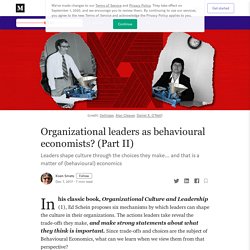
The actions leaders take reveal the trade-offs they make, and make strong statements about what they think is important. Since trade-offs and choices are the subject of Behavioural Economics, what can we learn when we view them from that perspective? In Part I we zoomed in on two of the mechanisms; this post focuses on the remaining four. Organizational leaders as behavioural economists? (Part I)
Leadership is about choosing how you show up A recent Harvard Business Review article suggested that COOs should think like behavioural economists.
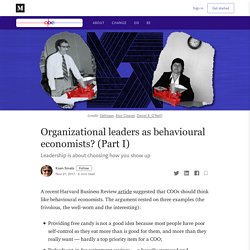
The argument rested on three examples (the frivolous, the well-worn and the interesting): Providing free candy is not a good idea because most people have poor self-control so they eat more than is good for them, and more than they really want — hardly a top priority item for a COO;Default opt-in for retirement savings — a heavily overused and increasingly tired example of nudging (are there any people who have not yet heard many times that this makes more people put money aside?)
Management Innovation eXchange. Crisis leadership: An agenda for troubled times. Leadership matters most—and is hardest to do well—when people face objective threats, when old ways of working are no longer possible, and when confusion and anxiety abound.
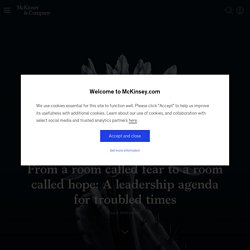
These are brutal and relentless facts of organizational life for tens of thousands of leaders who feel heightened responsibility for billions of people as a result of the COVID-19 crisis. The Role of a Manager Has to Change in 5 Key Ways. – Intelligence in decision-making. Enseignant, consultant et chercheur en stratégie d’entreprise, Dominique Turcq a abordé cette discipline avec plusieurs angles.

[Podcast Eyrolles Business by Rumeur Publique] GAFAnomics : comprendre les super-pouvoirs des GAFA. Codex biais ouverture. Twitter. « Le management utilitariste n’est clairement pas soutenable » Tribune.
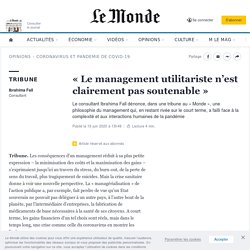
Fs 2020 dt organisations du travail avril. Daniel Kahneman: Putting Your Intuition on Ice. Psychologist and Nobel laureate Daniel Kahneman reveals the actions we can take to overcome the biases that cripple our decision-making, damper our thinking, and limit our effectiveness.
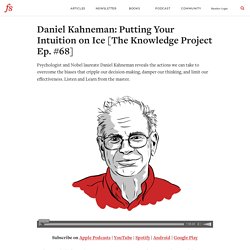
Listen and Learn from the master. Subscribe on Apple Podcasts | YouTube | Spotify | Android | Google Play Today, I’m thrilled to welcome one of our most requested guests to The Knowledge Project, psychologist and recipient of the 2002 Nobel Prize in Economics Sciences, Daniel Kahneman. Often credited as a founding father of the field of behavioral economics, (along with his dear friend and research partner, Amos Tversky,) Daniel has been conducting eye-opening experiments and research demonstrating the unreliability of human rationality for over 40 years. How Reframing Your COVID-19 Experience Can Support Emotional Wellbeing.
Editor’s note: This week, we feature guest blogger Dr.
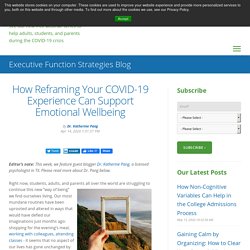
Katherine Pang, a licensed psychologist in TX. Please read more about Dr. Pang below. Right now, students, adults, and parents all over the world are struggling to continue. What Makes Work Meaningful — Or Meaningless – MIT Sloan Management Review. 1.
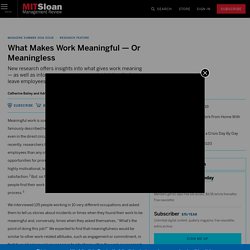
V.E. Frankl, “Man’s Search For Meaning” (Boston: Beacon Press, 1959). 2. W.F. Cascio, “Changes in Workers, Work, and Organizations,” vol. 12, chap. 16 in “Handbook of Psychology,” ed. 3. 4. Comprendre les biais cognitifs en pleine crise du coronavirus avec Olivier Sibony. Authentic Happiness. The HBR List: Breakthrough Ideas for 2010. When the business community supports an idea, change can happen fast.
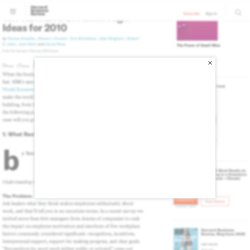
HBR’s annual ideas collection, compiled in cooperation with the World Economic Forum, offers 10 fresh solutions we believe would make the world better. Ranging from productivity boosting to nation building, from health care to hacking, any of the ideas presented in the following pages could go far with broad-based buy-in. The Progress Principle: Using Small Wins to Ignite Joy, Engagement, and Creativity at Work. Does Management Really Work? Executive Summary Reprint: R1211D HBR’s 90th anniversary is a sensible time to revisit a basic question: Are organizations more likely to succeed if they adopt good management practices?
The answer may seem obvious to most HBR readers, but these three economists cast their net much wider than that. In a decadelong study of thousands of organizations in 20 countries, they and their interview teams assessed how well manufacturers, schools, and hospitals adhere to three management basics: targets, incentives, and monitoring. What Cross-Silo Leadership Looks Like. Though most executives recognize the importance of breaking down silos to help people collaborate across boundaries, they struggle to make it happen. That’s understandable: It is devilishly difficult. Think about your own relationships at work—the people you report to and those who report to you, for starters. Now consider the people in other functions, units, or geographies whose work touches yours in some way. Which relationships get prioritized in your day-to-day job?
We’ve posed that question to managers, engineers, salespeople, and consultants in companies around the world. Le temps du leadership. The #COVID19 pandemic is highlighting the need to project not only #leadership but humanity. By humanity, I mean attentiveness and awareness of others. —Morela Hernandez, @dardenmba. Don’t Blink! The Hazards of Confidence. Mutual funds are run by highly experienced and hard-working professionals who buy and sell stocks to achieve the best possible results for their clients. Nevertheless, the evidence from more than 50 years of research is conclusive: for a large majority of fund managers, the selection of stocks is more like rolling dice than like playing poker.
At least two out of every three mutual funds underperform the overall market in any given year. More important, the year-to-year correlation among the outcomes of mutual funds is very small, barely different from zero. The funds that were successful in any given year were mostly lucky; they had a good roll of the dice. There is general agreement among researchers that this is true for nearly all stock pickers, whether they know it or not — and most do not. Expérience de Asch , le conformisme. A la recherche de l’entreprise rêvée. En cette période de bouleversement technologique, la « gestion du changement » est la préoccupation du moment.
Mais, avant d’être géré, ce changement doit s’opérer en profondeur, estiment les tenants de l’« entreprise libérée », qui prônent la suppression des hiérarchies pyramidales traditionnelles. Parce qu’à l’heure actuelle, « les humains titubent maladroitement comme des pingouins sur la terre ferme », dit Frédéric Laloux, l’un des tenants de cette nouvelle pensée managériale, dans Reinventing Organizations. Vers des communautés de travail inspirées (Diateino, 484 pages, 28 euros). Il exhorte les entrepreneurs à donner plus de marge de manœuvre à leurs collaborateurs, pour libérer les énergies, la créativité. L'« entreprise libérée » fait des émules en France. C'est l'histoire d'un beau rebond. En 2009, le chiffre d'affaires de Chrono Flex s'effondre.
[ETUDE] 46% des salariés français ont le sentiment d'être parfois infantilisés par leur hiérarchie. Via @philonomist et @IfopOpinion #QVT #RH #Management □ Five Rules for Leading in a Digital World. Topics (Re)Learn to Lead. Comment naissent les idées lumineuses ? Le grand mystère de la créativité. Older and Wiser? How Management Style Varies With Age – MIT Sloan Management Review. References (21) 1. L. Le leadership est-il un savoir-faire opérationnel ? Réponse avec la chronique d'Eric-Jean Garcia @sciencespo #uniformité #compétence #pluralité ➡ The Benefits of Framing Culture as a Management System. By approaching managerial decisions through the lens of culture, leaders can make a bigger impact for the organization and its employees.
Corporate culture is undergoing a transformation. As organizations evolve and reinvent themselves in response to societal changes, new technologies, and competitive disruption, they’re finding that hierarchical cultures of the past must change as well. And while the shape and impact of corporate culture is changing in the 21st century, the role it can play as a determinant of success is not waning anytime soon.
Rainer Strack: The workforce crisis of 2030. Guide: Identify what makes a great manager. Google set out to determine what makes a manager great at Google. But first, a research team tried to prove the opposite: that managers actually don’t matter, that the quality of a manager didn’t impact a team’s performance. This hypothesis was based on an early belief held by some of Google’s leaders and engineers that managers are, at best, a necessary evil, and at worst, a layer of bureaucracy. The team defined manager quality based on two quantitative measures: manager performance ratings and manager feedback from Google’s annual employee survey.
This data quickly revealed that managers did matter: teams with great managers were happier and more productive. Guide: Understand team effectiveness. Much of the work done at Google, and in many organizations, is done collaboratively by teams. The five keys to a successful Google team. Three Culture Conversations Every CEO Must Have With Their Head of HR. ORGANISATIONS LIVING THEIR VALUES 1556254582. Les 3 nouveaux équilibres essentiels du manager - Xerfi Canal - Novembre 2019. 1.1 Comprendre - Def - MOOC IA 2018 - MediaServer. Learning Lab "Human Change" Stratégies, gouvernances et challenges de l’intelligence artificielle en entreprise. Rapport synthese France IA. Intelligence Artificielle, les défis actuels et l'action d'Inria. Du manager au leader : devenir agile et collaboratif.
English below ! À propos du cours Ce cours est la NOUVELLE SAISON DU MANAGER AU LEADER ! Il vous forme : aux basiques du management aux nouvelles compétences stratégiques à acquérir, aujourd'hui, dans des organisations qui visent la transformation numérique : à devenir un manager agile à utiliser le design thinking pour innover et manager au quotidien à travailler en mode collaboratif et à créer de l'intelligence collective à devenir un leader respecté Il est vivement conseillé de compléter ce MOOC par le nouveau MOOC de Cécile Dejoux «L'IA pour les managers» conçu avec les plus grands spécialistes de l’IA sur FUN (inscription 14 janvier 2019) Si vous avez déjà fait une saison de ce MOOC, visionnez uniquement la semaine 5.
Format : Le cours comprend 6 semaines. r18 2791. How Platforms Change Structure and Strategy Marshall Van Alstyne. - Broadcast Yourself. Cécile Dejoux, Du manager agile au leader designer. Untitled. The Opposable Mind: How Successful Leaders Win Through Integrative Thinking. - Critical Thinking Model 1. To Analyze Thinking We Must Identify and Question its Elemental Structures. Do Your Employees Feel Respected? Executive Summary When you ask workers what matters to them, respect from superiors often tops the list. Yet employees report more disrespectful and uncivil behavior each year. Patagonia, un exemple en matière de culture d'entreprise.